- Phone: (+212) 520 500 200
- Email : [email protected]
Key Stage 5 Overview
Background
A Levels, also known as advanced level qualifications, are subject-specific qualifications that allow you to progress to university, work, or further training. Furthermore, as the only provider in Morocco, BISC is also able to offer BTEC qualifications (Business and Technology Education Council). Both qualifications are universally recognised for their academic rigour and are accepted by all global tertiary educational providers.

Options

KS5 students are given the opportunity to study a wide range of differing subjects. However, in certain subjects (e.g., STEM and MFL) students must have achieved at least a B grade at GCSE to be accepted onto the course.
Students will undertake four subject options in Year 12, dropping to three in Year 13. It is commonly accepted that taking four A levels to impress competitive universities is now misguided. The quality of learning matters far more and so performing well in your chosen three A levels will help you secure the best place possible.
Subjects
The British curriculum is noted for its breadth of study, often teaching subjects which are not normally covered in other countries. As such, all students (based on their ability) will have the opportunity to study subjects from the following areas of the curriculum:
STEM
- Mathematics
- Science
- Economics
Modern Foreign Languages
- French
- Arabic
- Spanish
Humanities
- History
- Geography
- Business Studies
Creative Arts
- Academic PE
- Art
- Music
*These subjects are taught as BTEC’s.
Current subjects on offer at BISC include English Literature, Mathematics, Further Mathematics, Biology,
Chemistry, Physics, Computer Science, Economics, History, Geography, Law, Sociology, *Business Studies,
Travel and Tourism, *Academic PE, French, Arabic and Spanish.

Compulsory elements

As an international school, we are keenly aware of the need to prepare our students for the rigours of tertiary education. This means we provide additional tuition aimed at improving the core English skills of our students – after all, most of our students will finally attend English-speaking universities.
This means students will have the following lessons dovetailed into their timetable
- 2 Lessons - English for Academic Purposes.
- 2 lessons - IELTS (International English Language Testing System).
- 2 lessons - Physical Education.
Guided Teaching Hours
Our timetable is composed of 30 lessons per week which are 55 minutes long. On average a BISC student will undertake 200+ hours of guided tuition per subject over the academic year, compared to 180 hours for a student in the UK.
This means every student will receive 5 – 6 hours tuition per subject, per week with additional support provided during individual targeted intervention sessions in Term 2. Clearly if there is a need for any further support, our academic team will do their best to accommodate during their non-contact hours.
Opportunities for private study during the school day are limited in Year 12 as we prefer to keep student timetables filled with scheduled lessons.
However, this changes in Year 13 when students are allowed up to 6 hours private study sessions per week – this is done to prepare them for the realities of university life when they are expected independently.
For more details on the curriculum content for the core subject areas please go to
Assessment opportunities
All students sit formal internal assessments in their chosen subjects (excluding EAP, IELTS and PE) every 5 to 6 weeks during the academic year, the results of which are then published in their ½ termly report.
In addition to this, all students will sit their mock examinations in the first month of Term 2 to assess their suitability to undertake the final examination in Term 3.
Finally, subject teachers will also obtain numerous examples of formative and summative assessments from the student during the year. This may include sampled coursework, examination style questions / essays, presentations etc. which help us identify a student’s potential strengths and weaknesses.
Teachers
All Secondary Teachers are UK trained subject specialists. This means they will hold a first degree in their subject
specialism, plus a Post Graduate Certificate in Education & Qualified Teacher Status.
*This does not include our French or Arabic teachers who are Moroccan nationals.
